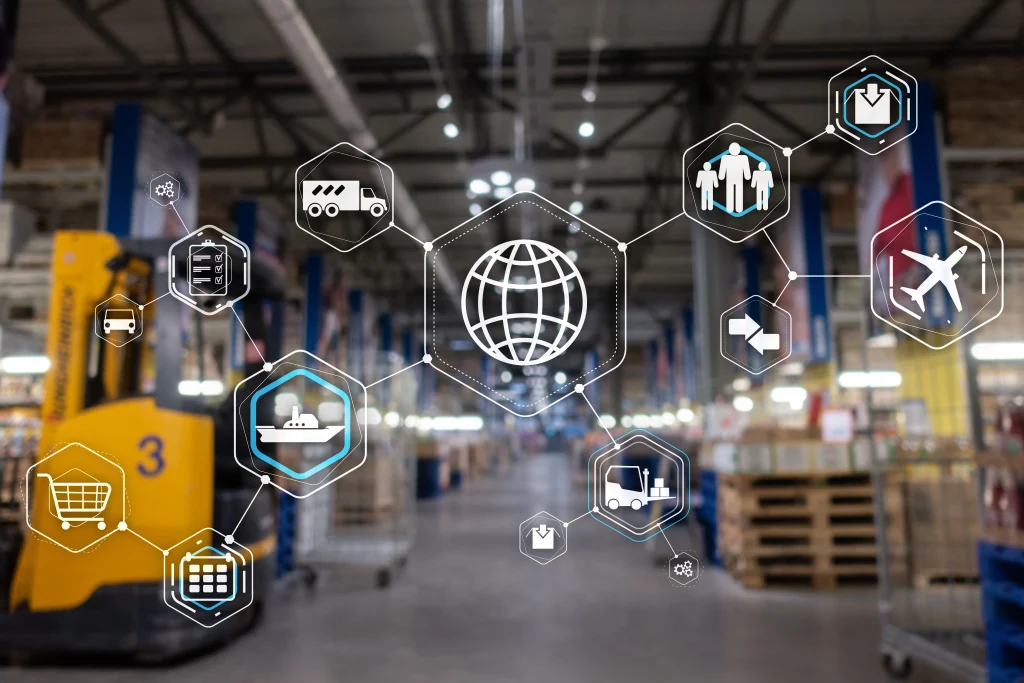The global supply chain is a complex network of interconnected processes that enable the efficient flow of goods and services around the world. As technology continues to advance at an unprecedented pace, one innovation stands out as a game-changer: Artificial Intelligence (AI). AI has the potential to revolutionize the global supply chain, enhancing efficiency, optimizing decision-making, and driving significant cost savings. In this article, we will explore the transformative power of AI and how it will reshape the global supply chain in the future.
- Enhanced Demand Forecasting: Accurate demand forecasting is crucial for supply chain management. AI algorithms can analyze vast amounts of historical and real-time data, considering various factors such as customer behavior, market trends, and even external factors like weather patterns. By leveraging this data, AI-powered systems can provide more accurate demand forecasts, enabling companies to optimize inventory levels, reduce stockouts, and improve overall supply chain responsiveness.
- Intelligent Inventory Management: Optimizing inventory management is a perennial challenge for supply chain professionals. AI can provide real-time insights into inventory levels, consumption patterns, and lead times, enabling businesses to achieve leaner operations and reduce costs. By employing machine learning algorithms, AI systems can predict optimal inventory levels, minimize excess inventory, and even automate replenishment processes. Such intelligence-driven inventory management will foster better demand fulfillment, reduce waste, and improve cash flow.
- Smart Warehousing and Robotics: AI-driven technologies are transforming the warehousing landscape. Intelligent robots equipped with computer vision and machine learning capabilities can enhance warehouse operations, automating tasks such as sorting, picking, and packing. These robots can work alongside human employees, increasing efficiency and reducing errors. AI-powered warehouse management systems can optimize layout, streamline routing, and improve resource allocation, resulting in faster order fulfillment and increased customer satisfaction.
- Predictive Maintenance: Equipment breakdowns and maintenance issues can disrupt the supply chain and cause significant financial losses. AI can mitigate such risks by implementing predictive maintenance strategies. By analyzing real-time sensor data, AI algorithms can identify patterns, detect anomalies, and predict equipment failures before they occur. This proactive approach allows companies to schedule maintenance activities, minimize downtime, and reduce unplanned repairs, resulting in improved operational efficiency and cost savings.
- Supply Chain Visibility and Traceability: Global supply chains often suffer from a lack of visibility and transparency. AI-powered systems can overcome this challenge by enabling real-time tracking and traceability across the supply chain. By leveraging technologies such as Internet of Things (IoT) devices, RFID tags, and blockchain, AI can provide end-to-end visibility, from raw material sourcing to final product delivery. This increased transparency enhances accountability, reduces counterfeit risks, and ensures compliance with regulatory standards.
- Optimized Route Planning and Logistics: AI algorithms can optimize route planning and logistics operations, considering various factors such as traffic conditions, fuel costs, and delivery time windows. By leveraging historical and real-time data, AI can identify the most efficient routes, recommend alternative transportation modes, and even optimize vehicle loading. These intelligent logistics systems can reduce transportation costs, minimize carbon emissions, and enhance overall supply chain agility.
- Supplier Relationship Management: Maintaining strong relationships with suppliers is crucial for a resilient supply chain. AI can facilitate supplier relationship management by automating routine communication, streamlining order processing, and even predicting supplier performance. By analyzing supplier data and external market factors, AI-powered systems can identify potential risks and opportunities, allowing businesses to make informed decisions and build robust supplier networks.
Conclusion
Artificial Intelligence is set to revolutionize the global supply chain, offering unprecedented opportunities for optimization, efficiency, and cost savings. By harnessing the power of AI, businesses can enhance demand forecasting, optimize inventory management, automate warehousing operations, implement predictive maintenance strategies, ensure supply chain visibility, optimize logistics, and improve supplier relationship management. The future of the global supply chain lies in the intelligent integration of AI technologies, paving the way for a more agile, resilient, and sustainable supply chain ecosystem. Embracing AI will be the key to gaining a competitive edge and thriving in the dynamic business landscape of tomorrow.


